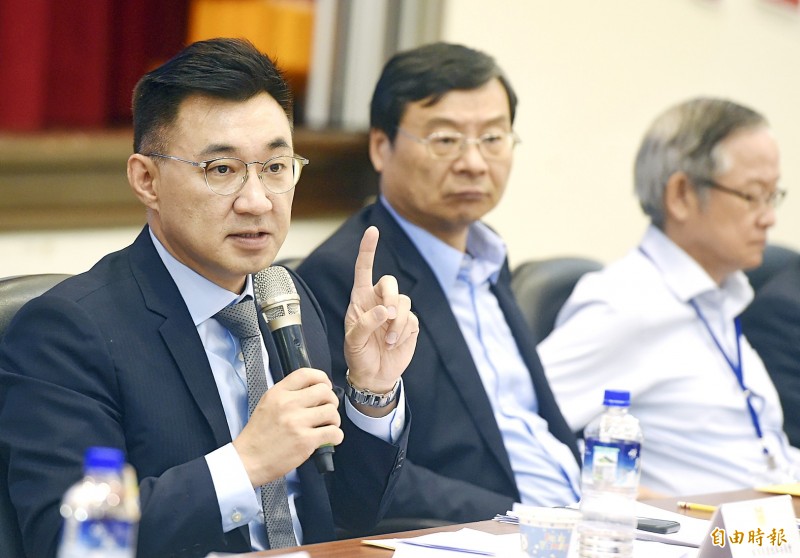《TAIPEI TIMES》 KMT task force unveils four pillars for stable, peaceful cross-strait relations

Chinese Nationalist Party (KMT) Chairman Johnny Chiang speaks at a meeting of the party’s reform committee in Taipei yesterday. Photo: Chien Jung-fong, Taipei Times
By Shih Hsaio-kuang and Dennis Xie / Staff reporter, with staff writer
A Chinese Nationalist Party (KMT) task force on cross-strait discourse has proposed new guidelines for the construction of stable and peaceful relations across the Taiwan Strait as part of the party’s reform efforts.
The task force, overseen by the KMT’s reform committee, proposed four pillars for the party’s handling of cross-strait relations at yesterday’s meeting of the committee: upholding the Republic of China’s national sovereignty; safeguarding freedom, democracy and human rights; prioritizing the safety of Taiwan; and creating win-win cross-strait relations.
In its presentation, the task force proposed that the “1992 consensus” should be viewed as “a historical description of past cross-strait interaction.”
The so-called “1992 consensus” — a term that former Mainland Affairs Council chairman Su Chi (蘇起) in 2006 admitted making up in 2000 — refers to a tacit understanding between the KMT and the Chinese Communist Party (CCP) that both sides acknowledge that there is “one China,” with each side having its own interpretation of what “China” means.
Although past KMT administrations had deemed the “1992 consensus” an important basis for seeking common ground in cross-strait interaction, the term has been marred by President Tsai Ing-wen’s (蔡英文) administration, the task force said.
Chinese President Xi Jinping’s (習近平) speech last year marking the anniversary of the 1979 “message to compatriots in Taiwan” also generated strong opposition to the term among Taiwanese, as Xi urged them to accept Beijing’s “one country, two systems” formula based on his claim that it was part of the “1992 consensus,” it added.
Tensions across the Taiwan Strait have not been higher since Beijing launched missile tests in 1996, as it attempted to influence Taiwan’s first direct presidential election that year, it said.
The task force recommended that the KMT, as a party with a strong sense of responsibility, use the guidelines to work toward stable cross-strait relations, saying that it should push for a legal mechanism with oversight powers that would allow cross-strait negotiations to be as open and transparent as possible.
Legislation should be drafted to regulate interaction between officials across the Strait so that exchanges based on inappropriate interests end, it said.
The KMT would continue to promote long-term economic and trade relations across the Strait, but would ensure that the fruits of such economic development benefit the majority of Taiwanese, the task force said.
“We will do everything we can for peace, but we will never kneel down for it,” the task force said. “The KMT will never accept any option that alters the national sovereignty of the Republic of China — therefore ‘one country, two systems’ is not an option for Taiwanese.”
“We also know that Taiwanese independence is unfeasible. Cutting off Zhonghua (中華) symbols and slashing the inheritance of the minkuo (民國) would not only create rifts in Taiwanese society, but also block the support that it receives from the international community, which it needs very much,” it added.
The four guidelines are the keys to resolving long-time opposition between Taiwan and China, it said.
Following the presentation, KMT Chairman Johnny Chiang (江啟臣) said that the “change toward the ‘1992 consensus’ was not introduced by the KMT, but by Beijing and the Democratic Progressive Party (DPP), who have led the Taiwanese public to misunderstand and distrust the term.”
KMT members should be open-minded toward the variety of political views held by different generations of Taiwanese, he added.
Like the DPP, the KMT stands for national sovereignty, democracy and human rights, Chiang said, adding that he hopes the four guidelines can take the party to a better place on its way to reform.
新聞來源:TAIPEI TIMES



















